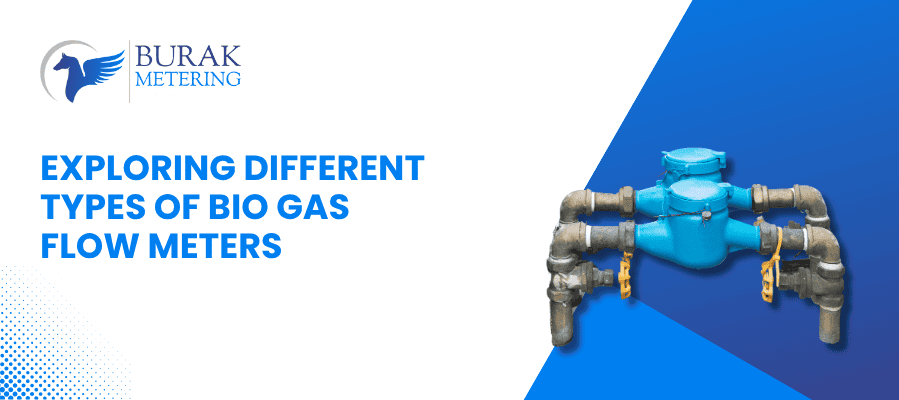 Phone
Phone

When it comes to monitoring biogas flow in plants, digesters, or other bioenergy facilities, accuracy matters. The right flow meter doesn’t just measure gas, it helps optimize performance, reduce wastage, and cut down operational costs.
In this guide, we’ll walk through the most commonly used biogas flow meters, their working principles, advantages, and how to select the best one for your system.
Biogas plants depend on precise measurements to maintain efficiency. A reliable flow meter:
Without the right flow meter, inaccuracies can lead to higher expenses, inefficiency, and energy loss.
Turbine flow meters use a rotating turbine to measure gas velocity. The faster the turbine spins, the higher the gas flow.
Key Benefits:
Best used where precision is critical and the gas is relatively clean.
Instead of moving parts, thermal mass flow meters measure the heat transfer properties of the gas.
Why They’re Popular:
Ideal for anaerobic digesters, where gas composition often changes.
Ultrasonic flow meters use sound waves to measure gas velocity. Since they don’t intrude into the pipe, they’re considered a non-invasive option.
Advantages:
A great choice for versatile biogas facilities where system design varies.
Coriolis flow meters rely on the Coriolis effect—gas flowing through a vibrating tube creates a measurable phase shift.
Standout Features:
They’re especially useful when biogas output directly impacts energy production or billing accuracy.
| Flow Meter Type | Accuracy | Best For | Advantages | Limitations |
|---|---|---|---|---|
| Turbine | ±0.5% | Clean gas, high-pressure applications | High accuracy, wide flow range | Moving parts can wear out |
| Thermal Mass | ±1% | Moist or dirty gas, anaerobic digesters | No moving parts, real-time monitoring | Performance may vary with gas composition |
| Ultrasonic | ±1% | Different pipe sizes, non-intrusive use | Non-invasive, minimal pressure drop | Higher cost, needs calibration |
| Coriolis | ±0.1% | High-precision operations, billing needs | Ultra-accurate, unaffected by pressure/density | Expensive, complex installation |
Selecting the best flow meter depends on several factors:
For example:
By evaluating these factors, operators can save money, minimize downtime, and boost efficiency in the long run.
The industry is moving toward smart, connected, and highly efficient solutions. Here’s what’s coming next:
These innovations promise greater accuracy, automation, and sustainability in bioenergy facilities.
The right biogas flow meter is more than just an instrument; it’s the key to unlocking efficiency, reducing costs, and maximizing energy production.
From turbine and thermal mass to ultrasonic and Coriolis meters, each option has unique advantages. Choosing the best one depends on your system’s specific needs.
Looking ahead, technologies like IoT, AI, and advanced sensors will make monitoring smarter and more reliable than ever.
For trusted solutions, explore flow meters from leading manufacturers like Burak Metering, known for innovation and accuracy in biogas measurement technology.
With the right flow meter, you’re not just measuring gas—you’re fueling a more efficient and sustainable future.
The best flow meter depends on system requirements. Thermal mass flow meters are ideal for gas with moisture or impurities, while Coriolis flow meters offer the highest accuracy.
Accurate measurement ensures efficient energy production, reduces waste, improves process control, and helps in proper billing for energy sales.
Yes, ultrasonic meters are widely used in biogas plants because they are non-intrusive, accurate, and work well across different pipe sizes.
Since they have no moving parts, thermal mass meters are resistant to clogging, making them suitable for biogas with dirt or moisture.
{ "@context": "https://schema.org", "@type": "FAQPage", "mainEntity": [ { "@type": "Question", "name": "What is the best flow meter for biogas measurement?", "acceptedAnswer": { "@type": "Answer", "text": "The best flow meter depends on system requirements. Thermal mass flow meters are ideal for gas with moisture or impurities, while Coriolis flow meters offer the highest accuracy." } }, { "@type": "Question", "name": "Why is accurate biogas flow measurement important?", "acceptedAnswer": { "@type": "Answer", "text": "Accurate measurement ensures efficient energy production, reduces waste, improves process control, and helps in proper billing for energy sales." } }, { "@type": "Question", "name": "Can ultrasonic flow meters be used in biogas plants?", "acceptedAnswer": { "@type": "Answer", "text": "Yes, ultrasonic meters are widely used in biogas plants because they are non-intrusive, accurate, and work well across different pipe sizes." } }, { "@type": "Question", "name": "How do thermal mass flow meters handle dirty gas?", "acceptedAnswer": { "@type": "Answer", "text": "Since they have no moving parts, thermal mass meters are resistant to clogging, making them suitable for biogas with dirt or moisture." } } ] }